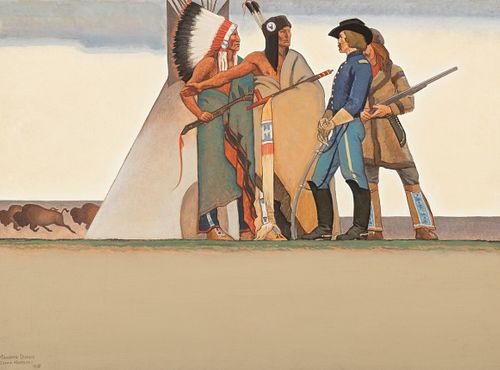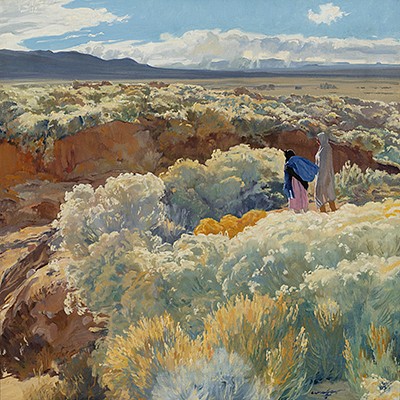Maynard Dixon (1875–1946) — Indian and Solider (The Indian of Yesterday); Indian and Teacher (The Indian of Today)
Lot 294
About Seller
Coeur d'Alene Art Auction
11944 North Tracey Road
Hayden, ID 83835
United States
Coeur d’Alene Art Auction specializes in the finest classical Western and American Art representing past masters and outstanding contemporary artists. The auction principals have over 100 years of combined experience in selling fine art and have netted their clients over $325 million in the last fif...Read more
Estimate:
$150,000 - $250,000
Absentee vs Live bid
Two ways to bid:
- Leave a max absentee bid and the platform will bid on your behalf up to your maximum bid during the live auction.
- Bid live during the auction and your bids will be submitted real-time to the auctioneer.
Bid Increments
| Price | Bid Increment |
|---|---|
| $0 | $100 |
| $2,000 | $250 |
| $5,000 | $500 |
| $10,000 | $1,000 |
| $20,000 | $2,500 |
| $50,000 | $5,000 |
| $100,000 | $10,000 |
| $200,000 | $25,000 |
| $500,000 | $50,000 |
| $1,000,000 | $100,000 |
About Auction
By Coeur d'Alene Art Auction
Jul 31, 2021
Set Reminder
2021-07-31 14:00:00
2021-07-31 14:00:00
America/New_York
Bidsquare
Bidsquare : Fine Western & American Art
https://www.bidsquare.com/auctions/coeur-dalene/fine-western-american-art-7138
The 2021 Coeur d’Alene Art Auction to be held July 31 in Reno, Nevada, will feature 394 selections of unparalleled quality in Western paintings and sculpture from historical and contemporary artists such as Charles M. Russell, Oscar Berninghaus, Walter Ufer, Frank Tenney Johnson, and more. Coeur d'Alene Art Auction info@cdaartauction.com
The 2021 Coeur d’Alene Art Auction to be held July 31 in Reno, Nevada, will feature 394 selections of unparalleled quality in Western paintings and sculpture from historical and contemporary artists such as Charles M. Russell, Oscar Berninghaus, Walter Ufer, Frank Tenney Johnson, and more. Coeur d'Alene Art Auction info@cdaartauction.com
- Lot Description
Maynard Dixon (1875–1946)
Indian and Solider (The Indian of Yesterday); Indian and Teacher (The Indian of Today)
oil on board; oil on board
25 × 34 inches; 25 × 34 inches
signed and dated lower left; signed and dated lower left
VERSO (both works)
Signed
Inscribed, “Maynard Dixon care Leo Von Heygendorff 50 Chaves Ave. San Francisco”
Label, Mark Sublette, Medicine Man Gallery, Tucson, Arizona
A signed copy of Maynard Dixon’s American West: Along the Distant Mesa by Mark Sublette will accompany the lot.
In 1938, the Treasury Section of Painting and Sculpture held a nationwide competition for the Bureau of Indian Affairs. Dixon was awarded a major commission to complete two murals for the Department of the Interior’s new building in Washington, D.C. Titled The Indian of Yesterday and The Indian of Today, each panel measured eight and a half by thirteen feet. When he finished this major effort he was asked to comment on his work.
“Ever since the founding of Jamestown and Santa Fe our dealings with the Indian tribes have been a long series of wars and broken treaties down to to 1870s and ‘80s, ending in a sort of carpetbag era during the final settlement of the Great Plains and Rocky Mountain regions, 1890-1900, and the breaking up of the great Indian Reservations. Only recently our Government has undertaken a new policy based on a real understanding of Indian character and recognition of Indian rights long denied.
“Panel 1 – Indian and Soldier: Except for the Apaches (Arizona 1887) our 1st Indian wars were with Plains tribes: so I have chosen this type, with a cavalry officer of 1865-1880. The chief’s gesture says: ‘This is our land. You shall drive us no further.’
“Panel 2 – Indian and Teacher: The Indian says: ‘The Sun is our father, the Earth is our mother.’ The white man says: ‘The ground belongs to us.’ The Indian says: ‘We belong to the ground.’ The white man studies soil chemistry. The Indian prays to the Earth.
“The teacher takes a lump of soil from the furrow and tells the Indian boy – the new generation – how to make it produce. The old people look on, somewhat doubtful of new ideas, with some reverence for the old. The large corn plant stands for the generous earth, the young corn for cultivation; the fence for divided lands and the end of freedom. I have always felt something far more tragic in all this – but perhaps here is now also something of hope.”
LITERATURE
Mark Sublette, Maynard Dixon’s American West: Along the Distant Mesa, Just Me Publishing, 2018, front and back endpapers, pp. 310-11, illustrated
View more informationSurface condition of both works is good. Spots of inpainting throughout.Condition
- Buyer's Premium



 EUR
EUR CAD
CAD AUD
AUD GBP
GBP MXN
MXN HKD
HKD CNY
CNY MYR
MYR SEK
SEK SGD
SGD CHF
CHF THB
THB
















